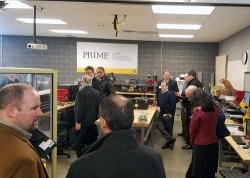 I had a chance to visit Wadsworth High School in Ohio to learn about SME (formally known as the Society of Manufacturing Engineers) Education Foundation’s PRIME program which focuses on building centers of excellence in manufacturing education. PRIME stands for Partnership Response In Manufacturing Education, and that is exactly what SME is trying to do around the country – to bring back advanced manufacturing education during a time when there is a big shortage of in-demand skilled talent in those positions, such as mechatronics, programming, welding, CNC machining, metrology and more.
I had a chance to visit Wadsworth High School in Ohio to learn about SME (formally known as the Society of Manufacturing Engineers) Education Foundation’s PRIME program which focuses on building centers of excellence in manufacturing education. PRIME stands for Partnership Response In Manufacturing Education, and that is exactly what SME is trying to do around the country – to bring back advanced manufacturing education during a time when there is a big shortage of in-demand skilled talent in those positions, such as mechatronics, programming, welding, CNC machining, metrology and more.
There will be large amounts of retirees in the next decade with very few new employees getting into those trades. Businesses are worried about their futures, and schools are catching on that they are the first step to showing students what these jobs entail.
Through the PRIME program, SME Education Foundation handles communication between both the local industrial employers needing staff for positions they can’t fill and the schools that are training the students in those types of jobs. It is beneficial for both the schools and businesses for SME Education Foundation to take the lead on running the program because of the experience they have. They are also able to get the equipment at better prices while local employers fund the program as well as help supply the equipment to the schools. Busy in the classroom, teachers would be unable to get the machines purchased and work on the needs of the employers to set up this program themselves.
 When visiting Wadsworth High School, we were able to see the rooms set up for training. They had the newest equipment, and students were very excited to show us what they were working on and their understanding of the machines. There was a local employer there as well, boasting about how well the program works, specifically targeting employers’ needs for jobs that cannot be filled right now. Employers also like the fact that the students are well-rounded with additional skills before they get out of the program.
When visiting Wadsworth High School, we were able to see the rooms set up for training. They had the newest equipment, and students were very excited to show us what they were working on and their understanding of the machines. There was a local employer there as well, boasting about how well the program works, specifically targeting employers’ needs for jobs that cannot be filled right now. Employers also like the fact that the students are well-rounded with additional skills before they get out of the program.
The students advised that they like the classes because they give them a chance to use their hands and learn with real equipment and parts instead of just books. The teachers say that this gives kids a different type of learning experience. Students are assigned projects where they have to think on their feet to figure out what is wrong and how to fix it.
PRIME gives students an understanding of whether or not they like this type of work. This has given many young adults who are not college-bound an opportunity for good jobs after high school. It also gives those who are going to college a better feel for what route they want to take. Some even decide to take different paths in college, such as engineering, that they would not have without their experience in the PRIME training. Additionally, employers are now able to have a long-term plan to fill their future job openings and have better communication with the local schools.
There is a serious effort to establish this program in Macomb County. If you are interested in more information, contact Stan Simik at ssimek@sme.org or Josh Cramer at jcramer@sme.org.
Josh Cramer, senior educational programs officer for SME, will make a presentation about PRIME for the Manufacturing Day Planning Committee. Readers who are interested in learning more about how to get involved are welcome to join from 8-10 a.m. Tuesday, March 21 at the Macomb Intermediate School District, Superior Room, 44001 Garfield Road, Clinton Township. Please send a quick email to maria.zardis@macombgov.org if you plan to attend.
 Jack Johns is a project coordinator for the Macomb County Department of Planning & Economic Development. He specializes in working with food, agriculture, energy, robotics, autonomous vehicle and retail businesses. If you are a business owner and would like to contact him, email jack.johns@macombgov.org or call (586) 469-6293.
Jack Johns is a project coordinator for the Macomb County Department of Planning & Economic Development. He specializes in working with food, agriculture, energy, robotics, autonomous vehicle and retail businesses. If you are a business owner and would like to contact him, email jack.johns@macombgov.org or call (586) 469-6293.